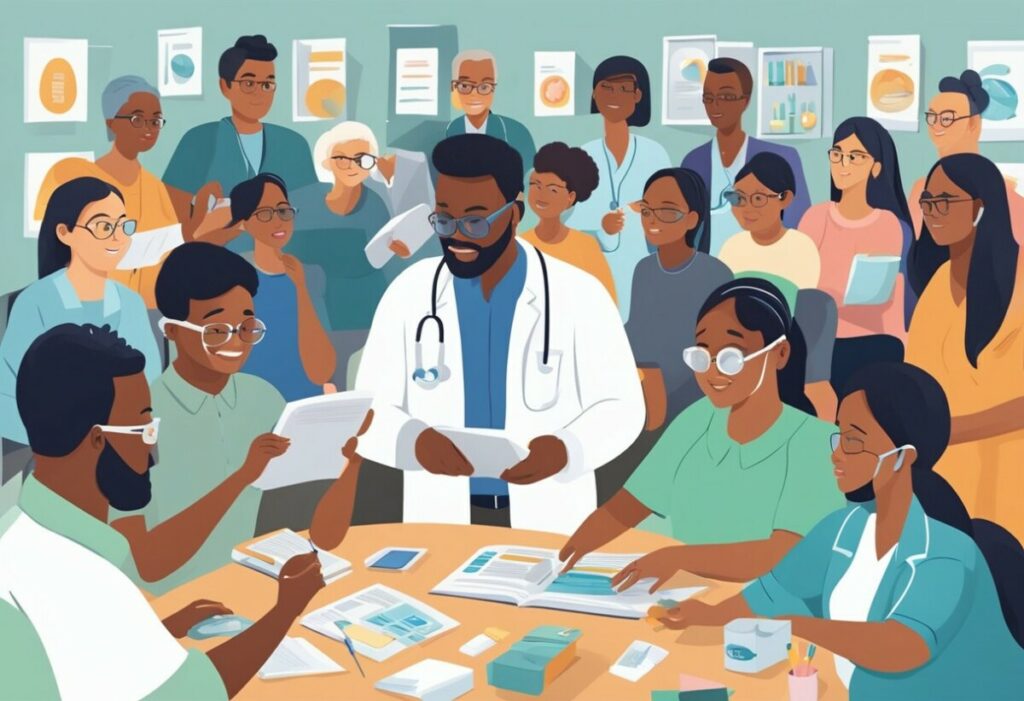Navigating Healthy Vision Month: Eye Health Tips for Visually Impaired

Understanding Healthy Vision Month
Welcome to our comprehensive guide on eye health tips for visually impaired individuals. In this resource, we provide valuable insights and practical advice tailored to support those managing visual impairments. From lifestyle adjustments to specialized technologies, discover strategies aimed at optimizing eye health and enhancing overall well-being.
May is a time when we focus on the importance of maintaining good eye health and having consistent eye examinations. It’s a period dedicated to raising public awareness about eye health and preventing loss of vision from common eye diseases.
Significance of Healthy Vision Month
Healthy Vision Month is an annual observance aimed at emphasizing the value of good vision and eye health. It serves as a crucial reminder for individuals to prioritize their vision health. Vision problems can significantly impact daily life, impairing the ability to work, learn, and interact with others. Age-related macular degeneration, cataracts, diabetic retinopathy, and glaucoma are some eye diseases that can lead to loss of vision or even blindness if not diagnosed and treated early. By focusing on preventative care, this month encourages everyone to take steps to protect their vision for the future.
Role of the National Eye Institute
The National Eye Institute plays a pivotal role in Healthy Vision Month by providing resources and awareness through its Vision Health Initiative. This leading organization’s materials guide individuals on how to care for their vision and highlight the impact of eye diseases. Each year, the Institute selects themes to address different aspects or populations affected by vision health challenges. Our team at New England Low Vision and Blindness supports these initiatives by offering access to a range of leading-edge assistive technology solutions and comprehensive training to enhance the quality of life for those with visual impairments.
Essentials of Eye Health
Maintaining eye health is crucial for supporting your ability to see the world clearly. Taking proactive steps in nutrition and protection can help prevent vision loss and manage eye conditions effectively.
Nutrition and Lifestyle Choices
Nutrition: The food we eat plays a significant role in maintaining healthy vision. Incorporating leafy greens, fish rich in omega-3 fatty acids, carrots, and citrus fruits into our diet provides nutrients such as vitamin C that are essential for eye health. These foods contribute to a healthy weight, which is crucial in preventing systemic conditions like diabetes and high blood pressure that can affect our eyes.
Lifestyle Choices: Lifestyle choices such as avoiding smoking can significantly reduce the risk of developing eye conditions that can lead to vision impairment. Ensuring physical activity and maintaining a healthy weight also contribute to overall eye well-being.
Importance of Protective Eyewear
Glasses and Contact Lenses: For those of us who are visually impaired, wearing the correct prescription glasses or contact lenses is vital. These aids not only improve our vision but also protect our eyes from strain and further damage.
Sunglasses: Wearing sunglasses is equally important as they shield our eyes from harmful UV rays, which can increase the risk of conditions such as cataracts. Always choose sunglasses that block out 99% to 100% of both UVA and UVB radiation.
At New England Low Vision and Blindness, we understand the importance of keeping your vision at its best. We advocate for regular check-ups with an eye care professional to monitor eye health and prevent vision loss through early detection and leading-edge solutions tailored to those who are visually impaired. Together, we can ensure that your vision is cared for with the utmost precision and care.
Preventive Measures and Regular Screening
As specialists in providing leading-edge assistive technology and training for those with visual impairments, we understand the power of prevention and early detection. Maintaining eye health is essential, which is why regular comprehensive dilated eye exams are recommended.
Comprehensive Dilated Eye Exams
A comprehensive dilated eye exam is critical for detecting eye conditions early, often before they cause symptoms. This type of eye exam is more thorough than a basic vision screening because it allows us to look at the back of your eyes. During the procedure, drops are placed in your eyes to dilate, or widen, the pupils. This dilation enables us to examine the retina and optic nerve for signs of damage and other eye problems. It’s a key step in managing overall eye health, and we recommend it for everyone, especially those who have experienced any changes in vision.
Common Symptoms and Early Warning Signs
Being aware of symptoms and early warning signs is vital in protecting your vision. If you experience symptoms like eye pain, redness, decreased vision, double vision, floaters, circles (halos) around lights, or flashes of light, it’s important to schedule an appointment right away. These symptoms can serve as early indicators of eye health issues. Early detection through regular eye exams and paying attention to vision changes can help preserve sight and, with our assistance, ensure you have access to the resources you need.
Regular eye examinations are critical for maintaining optimal eye health, especially for members of the legally blind community. Through these exams, you can ensure eye conditions are identified promptly and that the overall health of the eyes is closely monitored.
Early Detection of Eye Conditions
Early detection is indispensable as it allows for prompt intervention that can help preserve vision and slow down the progression of eye conditions. During an exam, optometrists can detect signs of glaucoma, cataracts, and other eye-related diseases that may not yet have manifested noticeable symptoms. For individuals who are legally blind, identifying these conditions early can be vital in maintaining their current level of vision and improving their quality of life.
Monitoring Eye Health Progression
By scheduling regular eye exams, you also facilitate the ongoing monitoring of any changes in vision or eye health. For our community members, it’s particularly beneficial to observe the progression of their eye condition to adjust their assistive technologies accordingly. Our role at New England Low Vision and Blindness involves providing and tailoring these leading-edge assistive technology solutions to each individual’s needs, ensuring they continue to engage with the world around them effectively.
Regular Eye Exams
A comprehensive eye exam is crucial for maintaining optimal eye health and overall well-being. Beyond just assessing visual acuity, such exams can uncover underlying conditions such as glaucoma, cataracts, or even systemic diseases like diabetes or hypertension, which may otherwise go undetected. Regular screenings ensure early detection and timely intervention, potentially preventing vision loss and preserving quality of life. Moreover, these exams offer personalized recommendations for preventive care and vision correction tailored to individual needs, empowering individuals to take proactive steps towards maintaining healthy eyesight.”
Eye Conditions Across Ages and Ethnicities
Understanding the diverse needs of individuals with visual impairments across different ages and ethnicities is crucial as we strive to raise awareness and facilitate better eye health. Each demographic faces unique challenges regarding vision, and it’s our mission to support these communities through education and by providing leading-edge assistive technology.
Age-Related Eye Health Challenges
Older adults often experience a natural decline in vision. Conditions such as macular degeneration, glaucoma, and cataracts become more prevalent with age. Regular eye exams are essential as they can detect these issues early on. For children, early detection of common conditions like amblyopia, also known as lazy eye, is critical for effective treatment. Ensuring eye health starts from a young age can help prevent vision problems from persisting into adulthood.
Focus on Minority Eye Health
Within the Hispanic/Latino communities, there are heightened risks for certain eye conditions. Our assistance extends to helping these families be aware of their increased risks for vision loss and the steps they can take to prevent it. We recognize that eye health outreach is vital in educating Hispanic/Latino families on preserving their vision. Families are encouraged to understand their eye health history and get regular check-ups, as this knowledge can be instrumental in safeguarding their sight.
In serving these diverse needs, we provide resources and technologies tailored for individuals across all age groups and ethnic backgrounds. Our goal is to ensure that no one is left without the support they need to enjoy a life full of visual experiences.
Innovation, Treatment, and Care
In recognition of Healthy Vision Month, it is crucial to emphasize the significant strides made in eye care technology and the available resources aimed at supporting patients and caregivers alike. Our commitment to informing and equipping those impacted by vision loss with the necessary tools and knowledge underlines everything we do.
Advancements in Eye Care Technology
Recent developments in eye care technology have transformed the landscape of treatment and care, offering new hope for preserving and enhancing vision. Laser therapy, particularly in the realm of eye surgery, has become increasingly sophisticated, allowing for more precise and less invasive procedures. Our innovative solutions are at the forefront of these advancements, helping to pave the way for better outcomes for those with vision impairments.
Leading-edge research is continually unveiling new treatments that target a range of eye conditions. These breakthroughs include everything from medication-based approaches to novel surgical techniques. Ophthalmologists are now able to tailor treatments more effectively to individual needs, largely due to the insights gained from such research. Our role is to ensure individuals have access to the latest and most effective treatments through our connections with professional eye care providers.
Resources for Patients and Caregivers
We understand the importance of not only having access to the right technology but also ensuring that patients and caregivers are informed about their condition and care options. It’s more than just about eye health; it’s about the quality of life. This Healthy Vision Month, we want to highlight our initiative to offer comprehensive eye health resources to those needing guidance, including information on minerals and vitamins important for eye health.
Comprehensive dilated eye exams are fundamental in detecting common eye problems early. We advocate for regular check-ups and provide information on what to expect and how to prepare for these exams. By doing so, we empower our clients with the knowledge to take proactive steps in managing their visual health, working closely with their eye doctor to determine the best course of action.
Our resources extend to various aspects of care, ensuring that individuals dealing with vision impairment have access to everything they need. We are here to support you with the right information and assistance to navigate the complexities of eye health.
Raising Awareness and Education
As leaders in providing leading-edge assistive technology and training for individuals with visual impairments, we are acutely aware of the importance of education and awareness during Healthy Vision Month. Our focus is on ensuring that individuals, families, and caregivers have access to crucial information that empowers them to make informed decisions about eye health.
Free Low Vision Guide
Be sure to download our free Low Vision Guide to help you or a loved one adapt to a world of vision loss here.






